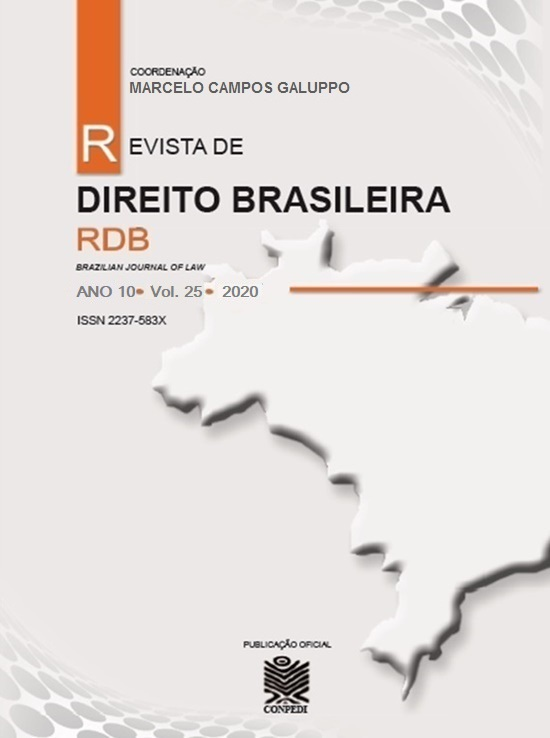LINES ABOUT CONSTITUTIONAL HEALING PROBLEM
Conteúdo do artigo principal
Resumo
Can the Constitution be healed? The aim of this article is the answer on how to deal with offenses committed in the face of the Constitution which are built on consolidated factual situations. Often the simple declaration of unconstitutionality, either from the beginning, the theory of nullity, or for the future, in annulability theory, or in conjunction both with the temporal modulation effects will not show positive responses to the constitutional offense. On the other hand, the recognition of unconstitutionality, although for the future, could lead to more harmful economic, political, social and legal effects than maintaining the offensive act. Sometimes the theory of constitutionalising supervening can respond appropriately, with the change of the constitutional paradigm. But what to do when the Constitution is even changed? The methodology for the development work is eminently literature and case law.
Downloads
Detalhes do artigo
• O(s) autor(es) garante(m) que a contribuição é original e inédita e que não está em processo de avaliação em outra(s) revista(s);
• A revista não se responsabiliza pelas opiniões, ideias e conceitos emitidos nos textos, por serem de inteira responsabilidade de seu(s) autor(es);
• É reservado aos editores o direito de proceder ajustes textuais e de adequação do artigo às normas da publicação.
Autores mantêm os direitos autorais e concedem à revista o direito de primeira publicação, com o trabalho simultaneamente licenciado sob a Licença Creative Commons Attribution que permite o compartilhamento do trabalho com reconhecimento da autoria e publicação inicial nesta revista.
Autores têm autorização para assumir contratos adicionais separadamente, para distribuição não exclusiva da versão do trabalho publicada nesta revista (ex.: publicar em repositório institucional ou como capítulo de livro), com reconhecimento de autoria e publicação inicial nesta revista.
Autores têm permissão e são estimulados a publicar e distribuir seu trabalho online (ex.: em repositórios institucionais ou na sua página pessoal) a qualquer ponto antes ou durante o processo editorial, já que isso pode gerar alterações produtivas, bem como aumentar o impacto e a citação do trabalho publicado (Veja O Efeito do Acesso Livre) emhttp://opcit.eprints.org/oacitation-biblio.html
Referências
BORGES DE OLIVEIRA, Emerson Ademir. Ativismo judicial e controle de constitucionalidade: impactos e efeitos na evolução da democracia. Curitiba: Juruá, 2015.
BULOS, Uadi Lâmego. Curso de direito constitucional. 5.ed. São Paulo: Saraiva, 2010.
CANOTILHO, J. J. Gomes. Direito Constitucional e Teoria da Constituição. 7.e.d. Coimbra: Almedina, 2007.
GRAU, Eros Roberto. A constituinte e a constituição que teremos. São Paulo: Revista dos Tribunais, 1985.
HESSE, Konrad. A força normativa da Constituição. Porto Alegre: Sérgio Antonio Fabris Editor, 1991.
JELLINEK, Georg. Teoria General del Estado. 2.ed. México: Fondo de Cultura Econômica, 2000.
KELSEN, Hans. Jurisdição constitucional. 2. ed. São Paulo: Martins Fontes, 2007.
________. Teoria geral do Direito e do Estado. São Paulo: Martins Fontes, 2000.
LARENZ, Karl. Derecho Justo: Fundamentos de Etica Juridica. Madrid: Civitas, 2001.
________. Lehrbuch des Schuldrechts. München: Verlag C. H. Beck, 1987. Band I: Allgemeiner Teil.
LASSALE, Ferdinand. ¿Qué es una Constitucion? Madrid: Editorial Cenit, 1931.
MENDES, Gilmar Ferreira. A declaração de inconstitucionalidade sem a pronúncia da nulidade da lei – “Unvereinbarkitser Klärung” – na jurisprudência da Corte Constitucional Federal Alemã. Revista de Informação Legislativa, Brasília, a. 30, n.118, abr./jun. 1993, p.61-84.
________. Controle abstrato de constitucionalidade: ADI, ADC e ADO: comentários à Lei n. 9.868/99. São Paulo: Saraiva, 2012.
________. Direitos fundamentais e controle de constitucionalidade. 3. ed. São Paulo: Saraiva, 2007.
________; COELHO, Inocêncio Mártires; BRANCO, Paulo Gustavo Gonet. Curso de Direito Constitucional. 3.ed. São Paulo: Saraiva, 2008.
MIRANDA, Jorge. Teoria do Estado e da Constituição. 3.ed. Rio de Janeiro: Forense, 2011.
NOVELINO, Marcelo. Direito Constitucional. 5.ed. Rio de Janeiro: Forense; São Paulo: Método, 2011.
O’BRIEN, David M. Constitutional Law and Politics. New York: W. W. Norton, 1991. v. 2: Civil Rights and Civil Liberties.
PESTALOZZA, Christian. Noch verfassungsmässige. In: STARCK, Christian (Hrsg.) Bundesverfassungsgericht und Grundgesetz: Festgabe aus Anlaß des 25jährigen Bestehens des Bundesverfassungsgerichtes. Tübingen: Mohr, 1976, v. I.
SCHMITT, Carl. Teoría de la Constitución. Madrid: Alianza Editorial, 2001.
URBANO, Maria Benedita. Curso de Justiça Constitucional: evolução histórica e modelos do controlo de constitucionalidade. 2.ed. Coimbra: Almedina, 2016.
VIEIRA, José Ribas; BRASIL, Deilton Ribeiro. A força normativa dos fatos como ferramenta do ativismo judicial utilizada para alargamento da competência do Supremo Tribunal Federal após a EC 45/04. Verba Juris, a.6, n.6, jan./dez. 2007, p.301-321.
WILLOUGHBY, Westel Woodbury. The constitutional law of the United States. New York: Baker, Voorhis, 1910. v. 1.





